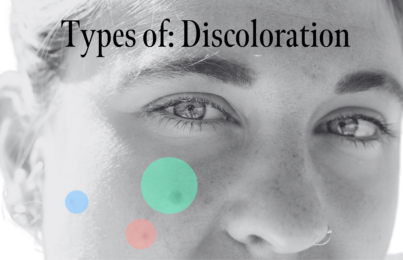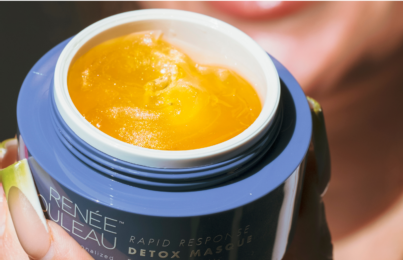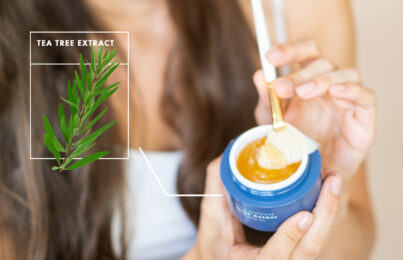We’ve all heard of the “pregnancy glow,” but what happens when this isn’t the case? At least half of pregnant women can expect to experience some form of acne during their pregnancy. Crazy, right? It’s a lot more common than people may think!
There’s no doubt that pregnancy is a delicate state that can be stressful to navigate as is, so adding acne into the mix definitely isn’t ideal (especially considering the fact that many traditional tried-and-true acne treatments are off-limits during pregnancy). Luckily, I’ve got some great tips for you! Because your skin is the last thing you should have to worry about during this special time.
Why Does Pregnancy Cause Acne in Some Women?
Now that you know how common it is to develop acne during pregnancy, let’s explore why it happens.
According to Dr. Ranella Hirsch, a board-certified dermatologist and former president of the American Society of Cosmetic Dermatology, the culprit behind pregnancy-related breakouts is—you guessed it—hormones.
“[Acne during pregnancy] is related to the increase in progesterone, which is a key hormone supporting the developing fetus,” says Dr. Hirsch. “Unfortunately, it also stimulates the production of sebum, which can lead to acne.”
Dr. Hirsch also mentions that pregnancy acne isn’t limited to hormonal blemishes—you can develop all types. It just depends on the person.
Acne-Fighting Ingredients NOT Safe During Pregnancy
First thing’s first, it’s important to know which ingredients are no longer safe to use while pregnant:
- Retinol or Retinoids
- Salicylic Acid (some doctors say this is okay in certain amounts, but be sure to consult with your OB before using any product containing salicylic acid)
- High-percentage professional chemical peels (although low-dose glycolic and lactic acids are still safe to use at home)
Here’s a list of Renée Rouleau products that should not be used during pregnancy (including alternative options).
*This list is focused on ingredients commonly used to fight acne and is not comprehensive. Always check with your doctor if unsure about using any personal care products or certain ingredients during pregnancy.
How to Safely Fight Acne During Pregnancy
In my thirty years working as an esthetician, I’ve treated many pregnant clients in the facial room and advised them on how to adjust their at-home skincare routines for pregnancy. Here, I’ve compiled my top tips for you to apply to your own routine.
Adjust Your Routine to Prevent Acne During Pregnancy
The most common mistake I see people make when they suddenly start to break out is that they overhaul their whole routine and start using only acne-focused products. This is something that was programmed into a lot of us during our teenage years—when you break out, start using products to dry up the blemishes, right?
The problem is that these products dry out the rest of your skin too, which can actually send oil production into overdrive. This, combined with dry skin on the surface trapping oil and bacteria underneath, is a recipe for more breakouts (not to mention irritation and/or redness!).
It’s important to understand that acne is an inflammatory disease, so preventing irritation is just as important for preventing blemishes as balancing oil production. Ultimately, you want to create an environment where your skin is calm, has a good balance of hydration without being too oily, and where bacteria is less likely to thrive.
Pregnancy-Safe Ingredients for Acne Prevention
At the end of the day, the best way to achieve this is by using a blend of oil-reducing and antimicrobial ingredients along with soothing anti-inflammatories and brightening humectants. These are my top suggestions:
- Lactic Acid (brightening humectant)
- Chamomile Extract (soothing anti-inflammatory)
- Green Tea Extract (soothing anti-inflammatory)
- Kaolin Clay (oil-absorbing)
- Witch Hazel (anti-inflammatory)
- Manuka Honey (antimicrobial)
- Tea Tree Oil (antimicrobial)
Instead of overhauling everything at once, I recommend getting ahead of potential breakouts by slowly introducing acne-fighting products into your routine. Start by swapping out your cleanser (I suggest this cleanser for preventing acne during pregnancy!), observe the results, then take it from there.
You can also look at the products in my line for skin types 1-4, all of which deal with acne. Each product page lists in the FAQs whether or not it’s safe for use during pregnancy.
Spot-Treat Blemishes as They Appear
When it comes to fighting active blemishes during pregnancy, I have two words: Spot. Treat. I’m a huge fan of this method for red, infected blemishes because it’s a good way to avoid unnecessarily drying out the parts of your skin that aren’t breaking out. The key when it comes to spot-treating is doing it correctly.
How to Effectively Spot-Treat a Blemish
Step 1: Apply a non-drying, anti-inflammatory spot treatment. You don’t want to apply anything drying yet, because this can cause the infection (which wants to come out) to become trapped under a layer of dry skin. Effective, pregnancy-safe ingredients to look for include ethyl lactate (a purified form of lactic acid ester) and methyl gluceth-20, which reduces redness and inflammation.
My top recommendation is Anti Bump Solution, which can also be used as a serum for acne-prevention. Simply apply a thin layer on acne-prone areas after cleansing and toning.
Step 2: If and only when a whitehead comes to the very surface of the skin, you can gently squeeze it out.
Step 3: Once the whitehead is removed, you can then apply a powerful spot treatment to dry out any remaining infection in the pore. Effective, pregnancy-safe ingredients to look for include sulfur, camphor, and zinc.
Step 4: Once your blemish and any scabbing are healed and you’re left with a discolored scar, use a fading gel. Effective, pregnancy-safe ingredients to look for include AHAs like lactic and glycolic acids, and sunscreen! Wearing sunscreen is the number one way to prevent scarring and dark marks, which are stimulated by UV rays. This is also true for melasma, a pigmentation disorder commonly brought on by pregnancy (it’s even been called the “mask of pregnancy”).
By following this process, you’re working with your body’s natural healing process instead of against it so that your blemish goes away as quickly as possible. Finally, always make sure you’re applying your spot treatment correctly.
What About Prescription Options?
If your acne becomes severe during pregnancy, you do have a few prescription options, according to Dr. Hirsch.
“We use topical azelaic acid in pregnancy,” she says, “and certain antibiotics (assuming their OB has okayed it).”
You can also find azelaic acid in non-prescription products, and it’s a great ingredient if you’re dealing with bumpy skin caused by clogged, non-infected pores.
Bottom Line
Because traditional acne-fighting ingredients are off-limits, dealing with acne during pregnancy can be a challenge. My tips are to prevent acne flare-ups by keeping the skin calm, and to spot-treat individual pimples as they appear to avoid irritating the rest of the skin.
I know that acne can be very stressful on top of an already stressful state. There’s no cure-all for it, so sometimes the best you can do is try not to worry about it too much since stress can add to acne. Stress reduction is very important, so try different activities that work for you whether it’s yoga, warm baths, massages, or, of course, getting plenty of sleep.
And when in doubt, don’t go it alone! You can book a virtual consultation with one of our amazing estheticians who will help guide you and adjust your routine during pregnancy. I hope you found this post helpful!
Want to know more? Learn how to prevent stretch marks from pregnancy.
Celebrity Esthetician & Skincare Expert
As an esthetician trained in cosmetic chemistry, Renée Rouleau has spent 35 years researching skin, educating her audience, and building an award-winning line of products. Her hands-on experience as an esthetician and trusted skin care expert has created a real-world solution — products that are formulated for nine different types of skin so your face will get exactly what it needs to look and feel its best. Trusted by celebrities, editors, bloggers, and skincare obsessives around the globe, her vast real-world knowledge and constant research are why Marie Claire calls her “the most passionate skin practitioner we know.”



